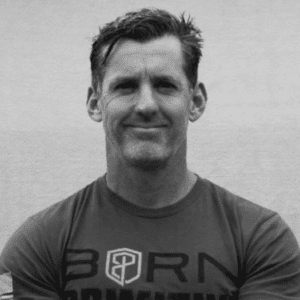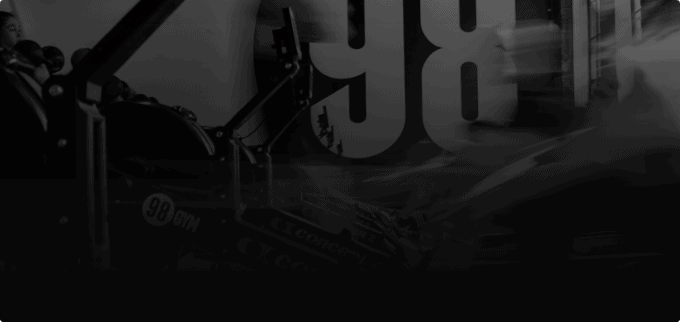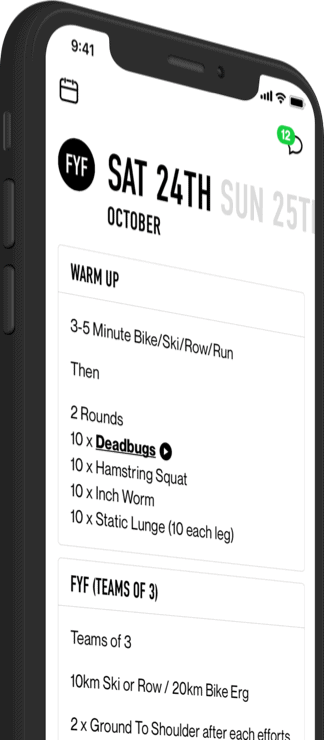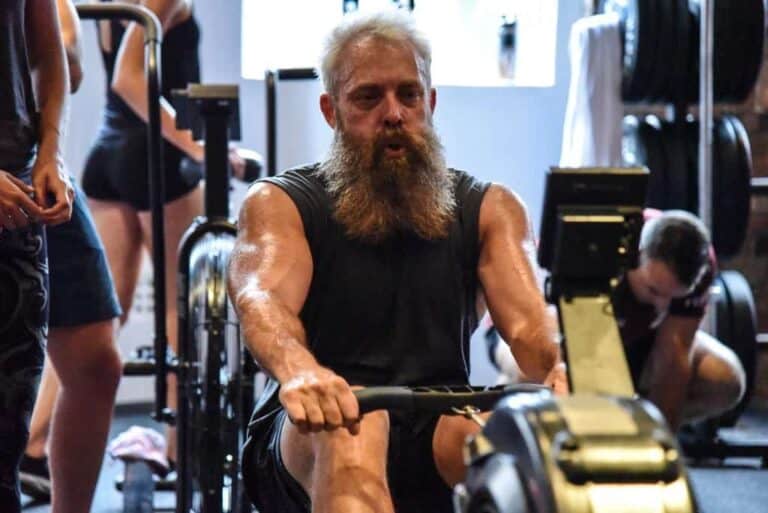Before you set yourself any long-term goal the first thing you want to do is set yourself up for success by developing the optimal mental and physical foundation. The number one factor when it comes to maintaining peak physical and mental performance is sleep. Sleep underlies nearly every function of the human body and importantly in this context, provides the much-needed physical and mental recovery from day to day. Physically this will allow you to achieve your best performance in every session and maximise recovery between workouts to show up every day. Mentally it will allow you to push harder, make better decisions and have the willpower and fortitude to weather the storm when things get tough.
Adequate sleep is considered to be consistently obtaining between 7 and 9 hours of sleep per night within a consistent routine. Despite this, sleep is often one of the first things sacrificed in an effort to try and achieve more. Self-imposed sleep deprivation has almost become popular by many as a self-martyr tool to illustrate their extreme work ethic, it is reported around two thirds of the population regularly get 6 hours or less and one third is chronically sleep deprived. However, the science behind the impact of lack of sleep would make many reconsider the sacrifice vs gain for what is literally, a form of self-imposed torture.
The impacts of poor sleep will negatively impact across every aspect of your performance and wellbeing with some of the following to be expected;
Physically:
- Decreased Testosterone profile to that of someone 10yrs older = (compromised recovery)
- Decreased physical performance by up to 30%
- Decreased lactate clearance, decrease lactate threshold and oxygen transport to the working muscle.
- Decreased ability for the body to thermoregulate, reducing performance
- Reduce strength and power output by 10 – 30% with a linear relationship to sleep time.
- Increased injury rate by 2x, with a perfect linear relationship between increased injury rate and decreased sleep time.
- Increased pain sensitivity and reduced tolerance
Nutritional:
- Dramatic decrease in glucose absorption, similar profile to being pre diabetic
- Increased eating by 300 extra calories per day
- Reduced self-control over nutritional choices
- Increased weight gain
- For individuals specifically trying to lose weight, 70% of weight loss occurs from muscle
Health:
- Increase risk of cancer, through 70% reduction in cancer fighting immune killer cells
- Decreased immunity
- Increase in rates of type 2 diabetes
- Increase in rates of depression
- Decreased fertility
- Appear less attractive
- Reduced life span, poor sleep damages chromosome ends (telomeres) that are predictive of life span.
- Degrades genetic engineering
Cognition:
- Decrease in short term memory
- Increase in risk of Alzheimer’s
- Up to 300% more likely to make serious errors/mistakes/accidents with an exponential increase per-hour of sleep deprivation
- 40% reduction in ability to learn new information / motor patterns
- Reduces problem solving, focus and persistence to resolve difficult tasks
- Reduces decision making ability
- Decreased integrity and increased blame behaviours
- Avoidance of difficult tasks and decisions
- Reduces creativity
- Reduces will power and self-discipline
- Reduced emotional regulation and emotional recognition and awareness in others
Workplace:
- Increased social loafing
- Avoidance of difficult tasks and decisions
- Decreased productivity
- Increased days lost to illness
- Costs the workplace an average of $2000 per person, $3500 for those who are specifically sleep deprived. National equivalent of 2% of a country’s GDP
- USED AS THE GO TO TORTURE TECHNIQUE IN DETAINED INDIVIDUALS AND POW’S.
By no means is this list exhaustive, there is a continuous growing body of evidence that demonstrates the negative impacts of sleep on every facet of our lives, health, wellbeing, performance and success. It’s not only limited to self-imposed deprivation, shift workers and those with irregular sleep patterns experience similar impacts. This is due to the importance of maintaining a regular circadian rhythm, which is our internal body clock cycle and regulates almost all of biological functions.
This body clock is reset every 24 hours by our initial morning exposure to natural light. This cycle also dictates the times when we are capable of peak performance and understanding our profile can positively inform when we do our best work and when we need to be aware that our performance might be compromised. These profiles, or circadian phenotypes sit along a continuum from early morning to late night. Indications are that 40% of the population are early risers, 30% are more productive late in the day and 30% sit somewhere in between. Understanding your phenotype can determine when you should optimally set your sleep routine and when you should schedule your periods for peak performance. The circadian rhythm itself flows in a wave like fashion, with performance peaks around mid-morning and again mid-afternoon with a trough just after lunch as illustrated in the below figure.

Modified from Fatigue science
With consistent routine your rhythm should maintain this pattern allowing optimal human performance. Through reducing sleep this pattern shifts down ward and continues to slide into state of highly compromised function. A theoretical model of this can be seen below.

Modified from Fatigue science
Recovery from this state can take weeks to months, experience working within special operations showed the decrease from a night of 4 or less hours sleep reduced the individual performance by over 30% and could take up to 4 days to return to normal, a period of 24 hours without sleep was even worse and took up to a week to recover from.
Even disrupting this routine by as little as an hour can have significant impact, waking an hour earlier can decrease physical and mental performance by up to 30% and increase cardiovascular stress. It’s reported that moving forward an hour for daylight savings time increases heart attacks by up to 24%, with similar increases in car accident rates. The relationship between wake time and peak performance for different phenotypes is illustrated in the following figure.

Figure 1; Represents the relationship between % of peak performance time and wake time.
Here we can see clear differences between time of day and performance in different circadian phenotypes. Understanding when you do your best work is key for scheduling important periods of your day and understanding when your physical and mental output is sub-optimal.
Peak Performance
For peak performance you should be aiming to set a regular sleep time that doesn’t vary by more than around 30 minutes either side and definitely no longer than an hour, with a sleep duration of around 7 and half hours per night. This will get you into a consistent circadian rhythm and keep you in a state of optimal function. If you miss a night here or there or have a bad sleep, don’t dwell on the fact. Acknowledge you may need to make some modifications that day, understand the impacts and make the most of what you have for the day and understand when to do the most important work both physically and mentally.
There are a number of daily habits that you can modify, remove or introduce that will help you achieve regular good sleep. Here are 12 recommended by Dr Mathew Walker;
12 Recommendations for good Sleep Hygiene
- Get a good sleep schedule – go to bed at the same time every night and wake up at the same time every morning. This is the most critical habit you can implement to improve every facet of your life.
- Avoid exercise late in the day – at least 2-3 hours prior to bed time. This allows for neural dampening to occur and reduction in body temp.
- Avoid caffeine and nicotine – these act as stimulants; caffeine has a half-life of 6 hours so try and avoid it late in the day. Consider what’s in your pre work if you train in the evening.
- Avoid alcohol prior to bed – alcohol might help you get to sleep but it destroys your REM sleep later in the night decreasing the total quality of sleep.
- Avoid large meals and beverages late at night.
- Avoid medicines that disrupt sleep (where possible).
- Don’t nap after 3p.m.
- Leave time to relax prior to bed, avoid anything that increases emotional arousal), (work emails, social media…etc)
- Take a hot bath before bed.
- Have a dark, cool (19-20°c), gadget free room
- Having your phone in your room increases your emotional arousal and interferes with sleep.
- Even the habit of checking your phone/emails immediately after you wake can create increases in anxiety during early morning sleep, disrupting the quality of your overall sleep. Try and make you r first interaction with a real human or go through a morning routine that primes you for the day prior to checking social/emails
- Get at least 30 mins per day of sunlight exposure
- Don’t stay in bed if you can’t sleep – get up and do something relaxing until you feel tired again









